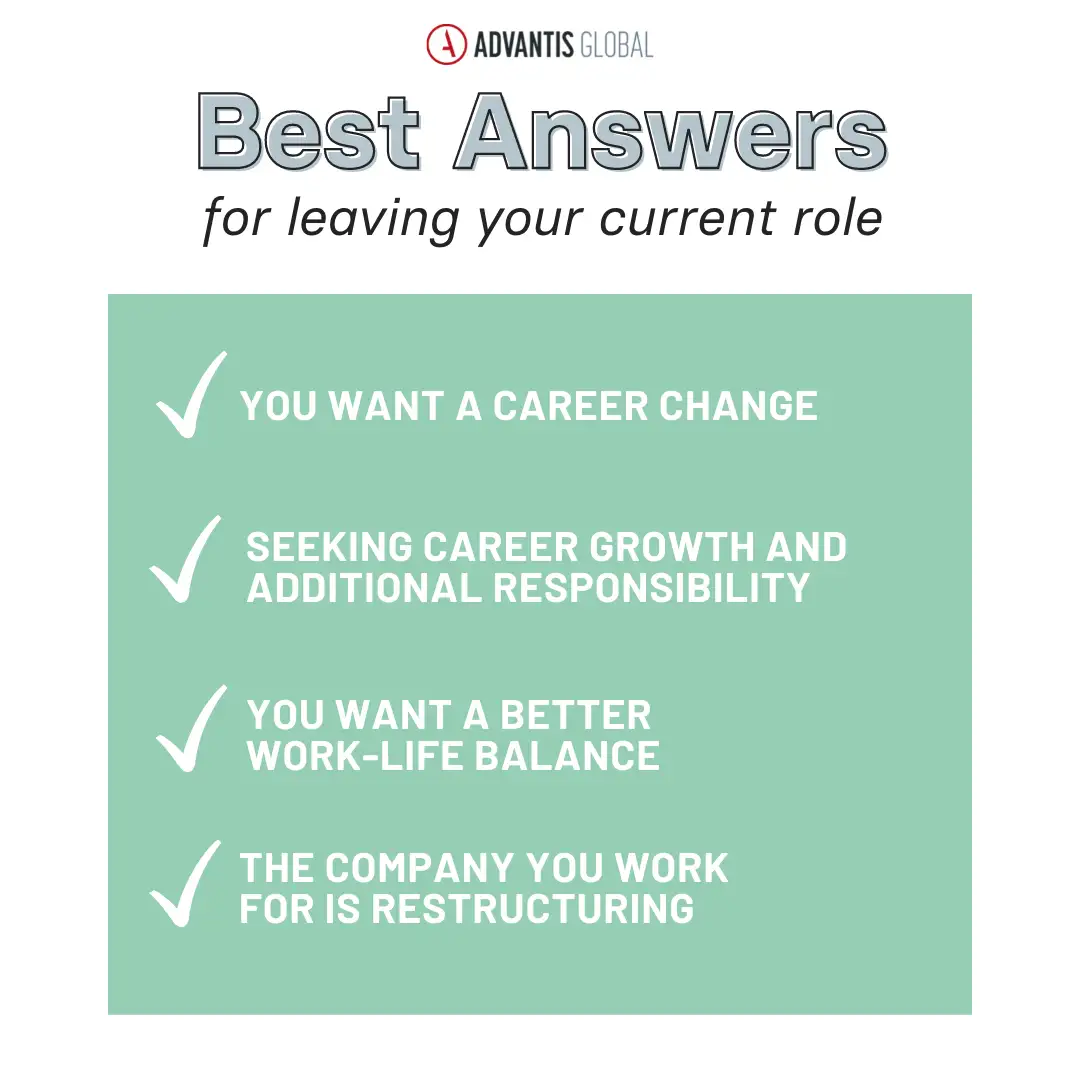
“What Is the Reason You’re Leaving Your Current Job?”- Answers Hiring Managers Want to Hear
You’ve landed a job interview, which is exciting news. Now you’re trying to prepare by coming up with answers to common interview questions like, “Why are you leaving your current job?” This particular question causes some apprehension in many job seekers, but with the right level of preparation, you’ll be able to answer it with ease.









Reasons Employers Ask the Question
While it’s true that employers want to know why you’re leaving your current job to learn if there are red flags or concerns they need to know about, it’s not the primary reason. Instead, employers typically ask why you’re leaving your current job to learn about your career goals and aspirations. Also, how you answer the question can say a lot about your personality and professionalism; if you answer with a negative and disgruntled response, it can cause an uneasy feeling for the interviewer compared to a response with a more positive outlook.
Best Answers for Leaving Your Current Job
There are plenty of valid reasons to leave your current job, and regardless as to which speaks to your situation, there’s no need to feel shame or guilt about it. Here are five of the best answers people provide for why they’re leaving their current job.

1. You Want a Career Change
If you decide that your current career path isn’t working for you, then you might decide changing careers is best. It could be because you want to have a passion for the work you do, you want your work to feel more purposeful, or you want a career path that allows more opportunities for growth and advancement. Whatever your specific reason is for wanting to make a career change, be honest about it with your prospective employer. You also want to follow up on your desire for a career change with what made you decide on the career path you’ve chosen to pursue.
2. You’re Seeking Career Growth Opportunities and Additional Responsibility
If you feel you’ve made it as far as you can go in your current position or with your current company, then it might be time to seek new opportunities. Though it’s not the case for everyone, many do want to be in a position where there’s the opportunity for professional development, career growth, and career advancement. Hiring managers and recruiters will understand this.
3. You Want a Better Work-Life Balance
If you’re in a position where you’re working well into the night, you’re quickly moving from stressed to burnt out, or it’s demanding to the point that you feel overworked without the ability to focus on things that are important to you outside of work, then moving on is often best. It could mean you’re seeking a position that’s more dependable as far as hours are concerned or allows for remote work, or you might even be looking for a lower-level position that comes with less responsibility than a higher-level position.
4. Your Partner Is Relocating
If your spouse or partner is relocating for their job, then it makes sense, of course, that you’d like to relocate with them. Relocation is one of the most straightforward reasons for leaving your current job and looking for a new one in your new location.
5. The Company You Work for Is Restructuring
When businesses restructure, it sometimes means that certain positions are eliminated. People are let go or offered new jobs that don’t align with what they’ve been doing or would like to do moving forward. In cases like these, seeking a new job is generally the best option.
What To Avoid When Answering Why You’re Leaving
It can be easy to want to be blunt about why you’re leaving your current organization when you might be feeling agitated or frustrated with your current situation, be it a poor manager, challenging coworkers, or a poor culture fit. Still, you want to use caution and avoid moving into dangerous territory that could leave a bad taste in the recruiter or hiring manager’s mouth.
Here’s what you should avoid when answering why you’re leaving your current job.
.webp)
1. Criticizing Former Colleagues and Managers
When you speak poorly about former colleagues and managers, even if what you’re saying is true, it’s an unprofessional approach and could make the interviewers wonder if you’d do the same to them if you were to leave the company after being hired.
2. Focusing on Compensation
Better pay and benefits are the top reasons why people seek a new job. If it’s your reason, it’s best to leave it unspoken unless the interviewer brings it up. If you frame it from the perspective that you’re looking for career growth and more responsibility, it’s inferred that you’re also looking for a pay raise. When the timing is right, you can discuss salary and negotiate your compensation if presented with an offer.
3. Complaining
Don’t go down a rabbit hole of what you didn’t like about your former organization. You risk coming across as negative and bitter if you do; those qualities are not ones your prospective employer wants to see or bring into their organization.
4. Being Unclear
If you can’t clearly articulate why you’re leaving your current job with a thoughtful response, you risk coming across as not truly interested in the new position or working for the prospective employer. You also run the risk of your vagueness piquing the interviewer’s curiosity as to whether there are any red flags they need to know about as to why you’re leaving.
Advantis Global Supports Career Advancement
If you’re seeking a new job in the tech world, Advantis Global can help. We work with a large range of companies seeking contract and permanent skilled talent, and our approach often helps candidates land a higher-level position.
Submit your resume or apply for a job to get connected to a recruiter today.
